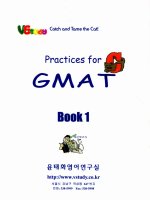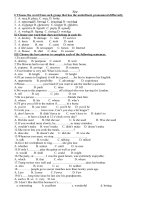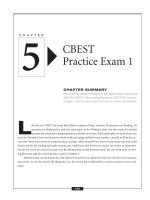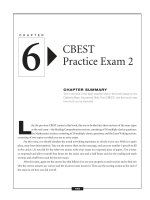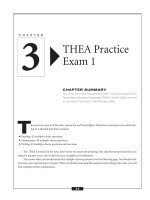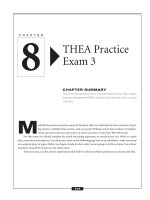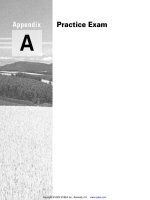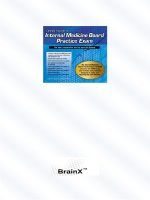THEA Practice Exam 1
Bạn đang xem bản rút gọn của tài liệu. Xem và tải ngay bản đầy đủ của tài liệu tại đây (291.16 KB, 44 trang )
T
his practice exam is of the same type as the real Texas Higher Education Assessment you will be tak-
ing. It is divided into three sections:
■
Reading, 42 multiple-choice questions
■
Mathematics, 48 multiple-choice questions
■
Writing, 40 multiple-choice questions and one essay
The THEA is timed, but for now, don’t worry too much about timing. Just take this first practice test in as
relaxed a manner as you can to find out your strengths and weaknesses.
The answer sheet you should use for the multiple-choice questions is on the following page. You should write
your essay on a separate piece of paper. When you finish answering the questions and writing your essay, you will
find complete answer explanations.
CHAPTER
THEA Practice
Exam 1
CHAPTER SUMMARY
This is the first of the three practice tests in this book based on the
Texas Higher Education Assessment (THEA). Use this test to see how
you would do if you were to take the exam today.
3
23
–
LEARNINGEXPRESS ANSWER SHEET
–
25
Answer Sheet
SECTION 1: READING SECTION 2: MATH SECTION 3: WRITING PART A
1. abcd
2. abcd
3. abcd
4. abcd
5. abcd
6. abcd
7. abcd
8. abcd
9. abcd
10. abcd
11. abcd
12. abcd
13. abcd
14. abcd
15. abcd
16. abcd
17. abcd
18. abcd
19. abcd
20. abcd
21. abcd
22. abcd
23. abcd
24. abcd
25. abcd
26. abcd
27. abcd
28. abcd
29. abcd
30. abcd
31. abcd
32. abcd
33. abcd
34. abcd
35. abcd
36. abcd
37. abcd
38. abcd
39. abcd
40. abcd
41. abcd
42. abcd
1. abcd
2. abcd
3. abcd
4. abcd
5. abcd
6. abcd
7. abcd
8. abcd
9. abcd
10. abcd
11. abcd
12. abcd
13. abcd
14. abcd
15. abcd
16. abcd
17. abcd
18. abcd
19. abcd
20. abcd
21. abcd
22. abcd
23. abcd
24. abcd
25. abcd
26. abcd
27. abcd
28. abcd
29. abcd
30. abcd
31. abcd
32. abcd
33. abcd
34. abcd
35. abcd
36. abcd
37. abcd
38. abcd
39. abcd
40. abcd
41. abcd
42. abcd
43. abcd
44. abcd
45. abcd
46. abcd
47. abcd
48. abcd
1. abcd
2. abcd
3. abcd
4. abcd
5. abcd
6. abcd
7. abcd
8. abcd
9. abcd
10. abcd
11. abcd
12. abcd
13. abcd
14. abcd
15. abcd
16. abcd
17. abcd
18. abcd
19. abcd
20. abcd
21. abcd
22. abcd
23. abcd
24. abcd
25. abcd
26. abcd
27. abcd
28. abcd
29. abcd
30. abcd
31. abcd
32. abcd
33. abcd
34. abcd
35. abcd
36. abcd
37. abcd
38. abcd
39. abcd
40. abcd
Section 1: Reading
Questions 1–6 are based on the following passage.
(1) The atmosphere forms a gaseous, protective
envelope around Earth. It protects Earth from the
cold of space, from harmful ultraviolet light, and
from all but the largest meteors. After traveling over
93 million miles, solar energy strikes the atmos-
phere and Earth’s surface, warming the planet and
creating what is known as the biosphere, which is the
region of Earth capable of sustaining life. Solar radi-
ation, in combination with the planet’s rotation,
causes the atmosphere to circulate. Atmospheric
circulation is one important reason that life on Earth
can exist at higher latitudes because equatorial heat
is transported poleward, moderating the climate.
(2) The equatorial region is the warmest part
of the Earth because it receives the most direct, and
therefore strongest, solar radiation. The plane in
which the Earth revolves around the Sun is called the
ecliptic. Earth’s axis is inclined 23
ᎏ
1
2
ᎏ
degrees with
respect to the ecliptic. This inclined axis is respon-
sible for our changing seasons because, as seen from
the Earth, the Sun oscillates back and forth across the
equator in an annual cycle. About June 21 each year
the Sun reaches the Tropic of Cancer, 23
ᎏ
1
2
ᎏ
degrees
north latitude. This is the northernmost point where
the Sun can be directly overhead. About December
21 of each year the Sun reaches the Tropic of Capri-
corn, 23
ᎏ
1
2
ᎏ
degrees south latitude. This is the south-
ernmost point at which the Sun can be directly
overhead. The polar regions are the coldest parts of
the Earth because they receive the least direct, and
therefore the weakest, solar radiation. Here solar
radiation strikes at a very oblique angle and thus
spreads the same amount of energy over a greater
area than in the equatorial regions. A static envelope
of air surrounding the Earth would produce an
extremely hot, unlivable equatorial region while the
polar regions would remain unlivably cold.
(3) The transport of water vapor in the atmos-
phere is an important mechanism by which heat
energy is redistributed poleward. When water evap-
orates into the air and becomes water vapor it
absorbs energy. At the equator, water vapor-satu-
rated air rises high into the atmosphere where winds
aloft carry it poleward. As this moist air approaches
the polar regions, it cools and sinks back to Earth. At
some point the water vapor condenses out of the air
as rain or snow, releasing energy in the process. The
now dry polar air flows back toward the equator to
repeat the convection cycle. In this way, heat energy
absorbed at the equator is deposited at the poles
and the temperature gradient between these regions
is reduced.
(4) The circulation of the atmosphere and the
weather it generates is but one example of the many
complex, interdependent events of nature. The web
of life depends for its continued existence on the
proper functioning of these natural mechanisms.
Global warming, the hole in the atmosphere’s ozone
layer, and increasing air and water pollution pose
serious, long-term threats to the biosphere. Given
the high degree of nature’s interconnectedness, it is
quite possible that the most serious threats have yet
to be recognized.
1. Which of the following best expresses the main
idea of the passage?
a. The circulation of atmosphere—now threat-
ened by global warming, the hole in the ozone
layer, and pollution—protects the biosphere
and makes life on Earth possible.
b. If the protective atmosphere around the Earth
is too damaged by human activity, all life on
Earth will cease.
c. Life on Earth is the result of complex interde-
pendent events of nature, events which are
being interfered with at the current time by
harmful human activity.
d. The circulation of atmosphere is the single
most important factor in keeping the bios-
phere alive, and it is constantly threatened by
harmful human activity.
–
THEA PRACTICE EXAM 1
–
27
2. Which of the following best represents the
organization of the passage?
a. I. definition and description of the circu-
lation of the atmosphere
II. how the atmosphere affects heat and
water in the biosphere
III. how the circulation of the atmosphere
works
IV. what will happen if human activity
destroys the atmosphere and other life-
sustaining mechanisms
b. I. origin of the atmosphere and ways it
protects the biosphere
II. how the circulation of the atmosphere
affects the equator and the poles
III. how the circulation of the atmosphere
interrelates with other events in nature
to protect life on Earth
IV. threats to life in the biosphere
c. I. definition and description of the circu-
lation of the atmosphere
II. protective functions of the circulation of
the atmosphere
III. relationship of the circulation of the
atmosphere to other life-sustaining
mechanisms
IV. threats to nature’s interconnectedness in
the biosphere
d. I. the journey of the atmosphere 93 mil-
lion miles through space
II. how the atmosphere circulates and pro-
tects the biosphere
III. how the atmosphere interrelates with
weather in the biosphere
IV. how damage to the biosphere threatens
life on Earth
3. Which of the following is the best definition of
biosphere as it is used in the passage?
a. the protective envelope formed by the atmos-
phere around the living Earth
b. that part of the Earth and its atmosphere in
which life can exist
c. the living things on Earth whose existence is
made possible by circulation of the
atmosphere
d. the circulation of the atmosphere’s contribu-
tion to life on Earth
4. Which of the following sentences from the pas-
sage best supports the author’s point that circula-
tion of the atmosphere is vital to life on Earth?
a. “The equatorial region is the warmest part of
the Earth because it receives the most direct,
and therefore strongest, solar radiation.”
b. “The circulation of the atmosphere and the
weather it generates is but one example of the
many complex, interdependent events of
nature.”
c. “[The atmosphere] protects Earth from the
cold of space, from harmful ultraviolet light,
and from all but the largest meteors.”
d. “A static envelope of air surrounding the Earth
would produce an unlivably hot equatorial
region while the polar regions would remain
unlivably cold.”
5. Based on the passage, which of the following is
directly responsible for all temperature changes
on Earth?
a. variations in the strength of solar radiation
b. variations in the amount of ultraviolet light
c. variation of biologic processes in the
biosphere
d. variation in global warming
–
THEA PRACTICE EXAM 1
–
28
6. The first paragraph of the passage deals mainly
with which of the following effects of the atmos-
phere on the Earth?
a. its sheltering effect
b. its reviving effect
c. its invigorating effect
d. its cleansing effect
Questions 7–12 are based on the following passage.
(1) The coast of the State of Maine is one of the most
________ in the world. A straight line running from
the southernmost city in Maine, Kittery, to the
northernmost coastal city, Eastport, would measure
about 225 miles. If you followed the coastline
between the same two cities, you would travel more
than ten times as far. This ruggedness is the result of
what is called a “drowned coastline.” The term comes
from the glacial activity of the Ice Age. At that time,
the whole area that is now Maine was part of a
mountain range that towered above the sea. As the
glacier descended, however, it expended enormous
force on those mountains and they sank into the sea.
(2) As the mountains sank, ocean water
charged over the lowest parts of the remaining land,
forming a series of twisting inlets and lagoons, of
contorted grottos and nooks. Once the glacier
receded, the highest parts of the former mountain
range that were nearest the shore remained as
islands. Although the mountain ranges were never to
return, the land rose somewhat over the centuries.
On Mt. Desert Island, one of the most famous of the
islands the glacier left behind in its retreat from the
coast of Maine, marine fossils have been found at
225 feet above today’s sea level, indicating that level
was once the shoreline.
(3) The 2,500-mile-long rocky and jagged
coastline of Maine keeps watch over nearly 2,000
islands. Many of these islands are tiny and uninhab-
ited, but many are home to thriving communities.
Mt. Desert Island is one of the largest—sixteen
miles long and nearly twelve miles wide—and one of
the most beautiful of the Maine coast islands. Mt.
Desert very nearly formed as two distinct islands. It
is split almost in half by Somes Sound, a very deep
and very narrow stretch of water seven miles long.
On the east side of the island, Cadillac Mountain
rises fifteen hundred and thirty two feet, making it
the highest mountain on the Atlantic seaboard.
(4) For years, Mt. Desert Island, particularly its
major settlement, Bar Harbor, afforded summer
homes for the wealthy. Recently, Bar Harbor has
made a name for itself as a burgeoning arts com-
munity as well. But there is much more to Mt. Desert
Island than a sophisticated and wealthy playground.
A majority of the island is unspoiled forest land,
and it makes up the greatest part of Acadia National
Park. Mt. Desert Island sits on the boundary line
between the temperate and sub-Arctic zones. There-
fore, the island supports the flora and fauna of both
zones, as well as beach, inland, and alpine plants.
And Mt. Desert Island lies in a major bird migration
lane; all kinds of migratory birds pass over the island.
All this is in addition to its geological treasures!
(5) The establishment of Acadia National Park
in 1916 means that this diversity of nature will be
preserved and that it will be available to all people,
not just the wealthy who once had exclusive access
to the island’s natural beauty. Today, visitors to Aca-
dia may receive nature instruction from the park
naturalists, in addition to enjoying the beauty of
the island by camping, hiking, cycling, or boating.
Or, visitors may choose to spend time at the arche-
ological museum, learning about the Stone Age
inhabitants of the island. The best view on Mt.
Desert Island, though, is from the top of Cadillac
Mountain. From the summit, you can gaze back
toward the mainland or out over the Atlantic Ocean
and contemplate the beauty created by a retreating
glacier.
–
THEA PRACTICE EXAM 1
–
29
7. Which of the following lists of topics best out-
lines the information in the passage?
a. I. ice-age glacial activity
II. the Islands of Casco Bay
III. formation of Cadillac Mountain
IV. summer residents of Mt. Desert Island
b. I. formation of a drowned coastline
II. the topography of Mt. Desert Island
III. the environment of Mt. Desert Island
IV. tourist attractions on Mt. Desert Island
c. I. mapping the Maine coastline
II. the arts community at Bar Harbor
III. history of the National Park system
IV. climbing Cadillac Mountain
d. I. the effect of glaciers on small islands
II. stone-age dwellers on Mt. Desert Island
III. the importance of bio-diversity
IV. hiking in Acadia National Park
8. Which of the following statements best expresses
the main idea of paragraph 4 of the passage?
a. The wealthy residents of Mt. Desert Island
selfishly kept it to themselves.
b. Acadia National Park is one of the smallest of
the national parks.
c. On Mt. Desert Island, there is great tension
between the year-round residents and the
summer tourists.
d. Due to its location and environment, Mt.
Desert Island supports incredibly diverse ani-
mal and plant life.
9. According to the passage, the large number of
small islands along the coast of Maine are the
result of
a. glaciers forcing a mountain range into the sea.
b. Maine’s location between the temperate and
sub-Arctic zones.
c. the irregularity of the Maine coast.
d. the need for summer communities for wealthy
tourists and artists.
10. The content of paragraph 5 indicates that the
writer believes that
a. the continued existence of national parks is
threatened by budget cuts.
b. the best way to preserve the environment on
Mt. Desert Island is to limit the number of
visitors.
c. national parks allow large numbers of people
to visit and learn about interesting wilderness
areas.
d. Mt. Desert Island is the most interesting
tourist attraction in Maine.
11. According to the passage, the coast of Maine is
approximately
a. 2,500 miles long.
b. 2,000 miles long.
c. 225 miles long.
d. 235 miles long.
12. In the context of paragraph 1, which of the fol-
lowing words best fits in the blank?
a. beautiful
b. irregular
c. hazardous
d. well-traveled
Questions 13–17 are based on the following passage.
(1) Businesses today routinely use large amounts of
both financial and non-financial information. Sales
departments keep track of current and potential
customers, marketing departments keep track of
product details and regional demographics, and
accounting departments keep track of financial data
and issue reports. To be effective, this data must be
organized into a meaningful and useful system. Such
a system is called a management information system,
abbreviated MIS. The financial hub of the MIS is the
accounting information system.
–
THEA PRACTICE EXAM 1
–
30
(2) Accounting is the information system that
records, analyzes, and reports economic transac-
tions, enabling decision makers to make informed
choices when allocating scarce economic resources.
It is a tool that enables the user, whether a business
entity or an individual, to make wiser, more
informed economic choices. It is an aid to planning,
controlling, and evaluating a broad range of activi-
ties. Bookkeeping, often confused with accounting,
is actually a subset of accounting. It is the compo-
nent of accounting that does the mechanical, repet-
itive record keeping; but it does not include the
analysis or reporting of economic information.
Modern accounting is usually separated into either
managerial accounting or financial accounting.
A managerial accounting system is intended only for
internal use by management. The primary guideline
for implementing a managerial accounting system is
that the information must be “useful.” A financial
accounting system is intended for use by both man-
agement and those outside the organization. Because
it is important that financial accounting reports be
interpreted correctly, financial accounting is sub-
ject to a set of ________ guidelines called “generally
accepted accounting principles” (GAAP).
(3) Accounting is based on the double-entry
system of bookkeeping that originated during the
Renaissance. Fundamental to the double-entry sys-
tem is the concept of duality. All economic events
have two components that offset and thus balance
each other: cost and benefit, work and reward, asset
and equity, debit and credit. Business transactions
are the building blocks of the accounting system. In
order to properly record transactions they must be
measured with a common yardstick. Money is the
measure of all business transactions and is the link
which enables economic data to be compared. There
are three basic criteria for measuring a business
transaction: a) When is the transaction recognized?
Traditionally, a transaction is recognized when legal
title passes from seller to buyer and an obligation to
pay results. b) What is the value of a transaction?
Value is generally agreed to be the original cost of a
good or service. c) How is a transaction to be clas-
sified? Correct classification places information
about the transaction into the proper account for
storage and later use. A simple account has three
parts: a title and two columns. The left column is
called the “debit”column. The right column is called
the “credit” column. A debit could represent an
increase or a decrease to the account, depending on
how the account is classified. The same is true for a
credit.
(4) Although records of the exchange of goods
and services have existed for centuries, it was the cre-
ation of the double-entry system of accounting that
enabled the development of the modern, highly
sophisticated methods of business control and
administration in use today.
13. This passage is most likely taken from
a. a newspaper column.
b. an essay about modern business.
c. a legal brief.
d. a business textbook.
14. The word that would best fit into the blank in the
final sentence of the second paragraph is
a. discretionary.
b. convenient.
c. austere.
d. stringent.
15. According to the information in the passage,
which of the following is LEAST likely to be a
function of accounting?
a. helping business people make sound judg-
ments
b. producing reports of many different kinds of
transactions
c. assisting with the marketing of products
d. assisting companies in important planning
activities
–
THEA PRACTICE EXAM 1
–
31
16. The word debit as it is used in the third para-
graph of the passage most nearly means
a. losses in a transaction.
b. an increase or decrease to the account.
c. a decrease to the account only.
d. an expenditure which lessens the amount in
the account.
17. The main purpose of paragraph 3 is to
a. define duality as it relates to business
transactions.
b. describe the double-entry system in keeping
track of financial transactions.
c. describe the common yardstick used to meas-
ure financial transactions.
d. outline the evolution of the double-entry
system since the Renaissance.
Questions 18–24 are based on the following passage.
(1) Light pollution is a growing problem world-
wide. Like other forms of pollution, light pollution
degrades the quality of the environment. Our abil-
ity to see and appreciate the night sky is being
steadily diminished by the ever-increasing use of
inappropriate night lighting. Where once it was pos-
sible to look up at the night sky and see thousands
of stars twinkling in the blackness, one now sees lit-
tle more than the yellow glare of urban sky glow.
(2) A basic component of light pollution is
glare. Glare occurs when light from a bright source
shines directly into the eyes. It is usually caused by
an unshielded, or improperly shielded, light source.
It can make driving on rainy, slick streets very haz-
ardous. Glare that crosses property boundaries and
creates a nuisance, is called “light trespass.” Light
trespass is becoming an important issue in many
suburban and rural communities because of the
increasing use of cheap, improperly shielded, 175-
watt, dusk-to-dawn mercury vapor light fixtures.
Typically, they are installed in an effort to improve
home security, on the theory that more light equals
more safety. This is a false belief for two important
reasons. First, the excessively bright light creates
deep shadows, perfect hiding places for criminals.
________, the light showcases one’s possessions and
reveals the layout of the property, ________ inviting
theft. The combined effect of glare from all urban
sources creates “sky glow,” that yellowish white glow
seen in the urban night sky. This is a very recent phe-
nomena in the history of mankind, beginning with
Thomas Edison’s invention of the incandescent light
bulb. Before this invention, cities were illuminated
first by torches and then by gaslight, neither of which
contributed much to the overall brightening of the
night sky.
(3) Not only is light pollution a nuisance but
it is also harmful to life forms whose rhythms
depend on celestial events. Birds migrating at night
use stars to navigate and can become lost when fly-
ing through a heavily light polluted region that
obscures their vision of the night sky. Newly hatched
sea turtles have become confused by the urban glow
of a nearby coastal city and instead of moving
toward the sea’s luminance, crawl toward the city’s
glow and their death. The circadian rhythms of
plants and animals are also affected by a twenty-
four-hours-a-day regimen of light. Birds that nor-
mally sing at dawn can now be heard singing in the
middle of the urban night. Plants will retain their
leaves longer near a strong night light and thus will
not be properly prepared for the arrival of winter.
(4) When we lose the ability to connect visu-
ally with the vastness of the universe by looking up
at the night sky, we lose our connection with some-
thing profoundly important to the human spirit,
our sense of wonder. Fortunately, this situation does
not have to be. Unlike other forms of pollution
where it may take years to repair the damage, light
pollution disappears immediately when corrective
action is taken. In the long run, it is cheaper to install
and maintain quality lighting that does not waste
energy by shining light that is too bright, where it is
not needed, and where it is not wanted.
–
THEA PRACTICE EXAM 1
–
32
18. The passage implies that the most serious dam-
age done by light pollution is to our
a. artistic appreciation.
b. sense of physical well-being.
c. cultural advancement.
d. spiritual selves.
19. According to the passage, light trespass is
increasingly a problem
a. for criminals who are hiding in the shadows.
b. in suburban and rural areas.
c. in rainy weather.
d. for migrating birds.
20. Which of the following words or phrases, if
inserted into the blanks in the passage, would
help the reader understand the sequence of the
author’s ideas?
a. Second ...thus
b. Then ...finally
c. Therefore . . . as a result
d. On the other hand ...still
21. The author’s main purpose in writing this pas-
sage is to
a. explain why bright exterior lights do not deter
burglars.
b. describe the circadian rhythms of plants and
animals.
c. highlight the growing problem of light
pollution.
d. review the history of the electric light.
22. Which of the following statements from the pas-
sage indicate the writer’s opinion, rather than
fact?
a. Glare that crosses property boundaries and
creates a nuisance is called “light trespass.”
b. Not only is light pollution a nuisance but it is
also harmful to life forms whose rhythms
depend on celestial events.
c. Unlike other forms of pollution, the damage
of which may take years to repair, light pollu-
tion disappears immediately when corrective
action is taken.
d. When we lose the ability to connect visually
with the night sky, we lose our connection
with something profoundly important to the
human spirit.
23. The passage maintains that light pollution can be
dangerous to species other than human beings
because it tends to hide
a. the stars.
b. predators.
c. food sources.
d. places of shelter.
Questions 24–29 are based on the following passage.
(1) The Sami are an indigenous people living in the
northern parts of Norway, Sweden, Finland, and
Russia’s Kola peninsula. Their traditional home-
lands once extended well onto the Scandinavian
peninsula, but the pressure of increased coloniza-
tion, mining operations, logging, and the construc-
tion of hydroelectric power plants have pushed the
Sami steadily north until today they are mostly
found north of the Arctic Circle. The Sami are more
commonly known as “Lapps” and their homeland is
often called “Lapland.” However, they object to
being called “Lapps” and consider this to be
a derogatory term because the word lapp means “a
–
THEA PRACTICE EXAM 1
–
33
patch of cloth used for mending.” This implies that
the Sami wear patched clothing and therefore that
they are poor people.
(2) There are several theories which seek to
explain the Sami’s origin but none have been proven
conclusively. One theory is that the Sami belong to a
much larger indigenous group of “circumpolar
tribes” who inhabit the northernmost part of Europe
and Asia. These circumpolar tribes once had similar
hunter/gatherer lifestyles and cultures. However, the
arrival of other peoples using firearms, a more effi-
cient hunting method, greatly reduced the popula-
tion of wild reindeer herds and other game on which
these circumpolar tribes depended. In order to sur-
vive, some of these native peoples became herders of
reindeer, others became fishermen, and still others
adopted the ways of the newcomers and became
farmers. Another theory of Sami origin is that they
are the descendants of reindeer hunters who immi-
grated up from the south. Proponents of a third theory
believe the Sami have inhabited the Scandinavian
peninsula since before the last Ice Age and lived in
warmer coastal areas during this glacial period. The
latter theory is supported by genetic studies that con-
clude the Sami have lived in isolation from other
European peoples for tens of thousands of years.
(3) Generally, there are three categories of
Sami. The Forest Sami are semi-nomadic and live by
hunting and fishing in coniferous forests. They make
limited use of reindeer for transportation and fur.
Most of the Swedish and Finnish Sami belong to this
group. The Sea Sami, who live on Norway’s northern
coast, are also semi-nomadic, hunting in winter and
fishing on the sea in summer. The Reindeer Sami,
who are nomads and make extensive use of reindeer,
tend their herds in the northern regions of Sweden
and Norway. Although this group is regarded as the
most typical form of Sami culture, it is, in fact, not as
common as the Forest Sami culture.
(4) Originally, the Sami religion was
________, which means nature and natural objects
have a conscious life, a spirit. One is expected to
move quietly in the wilderness and avoid making a
disturbance out of courtesy to these spirits. Ghengis
Khan is said to have declared that the Sami were
one people he would never try to fight again. Since
the Sami were not warriors and didn’t believe in
war, they simply disappeared in times of conflict.
They were known as “peaceful retreaters.” Even
though the Sami today are struggling to preserve
their cultural identity and way of life, there is hope,
for, as one Sami is quoted as saying, “We adapt our
ways to fit the times.”
24. Which of the following words would best fit into
the blank in paragraph 4?
a. superstitious
b. fallacious
c. fictitious
d. animistic
25. Based on the tone of the passage, which of the
following words best describes the author’s atti-
tude toward the Sami people?
a. admiring
b. pitying
c. contemptuous
d. patronizing
26. Which of the following is NOT a reason for the
Sami people moving steadily north?
a. increased colonization
b. government relocation policy
c. mining operations
d. hydroelectric power plants
27. According to the passage, indigenous people liv-
ing in the northern parts of Norway, Sweden,
Finland, and Russia’s Kola peninsula prefer to be
called
a. Lapps.
b. Scandinavians.
c. Sami.
d. Laplanders.
–
THEA PRACTICE EXAM 1
–
34
28. It can be inferred from the passage that the Sami
were known as “peaceful retreaters” because they
a. were afraid of foreign invaders.
b. were not citizens of any country and therefore
could not be drafted.
c. refused to learn to use modern weapons and
so were easily defeated.
d. would simply disappear in wartime.
29. Which of the following is NOT a category of the
Sami people?
a. the Forest Sami
b. the Sea Sami
c. the Mountain Sami
d. the Reindeer Sami
Questions 30–35 are based on the following passage.
(1) Milton Hershey was born near the small village
of Derry Church, Pennsylvania, in 1857. It was a
________ beginning that did not foretell his later
popularity. Milton only attended school through
the fourth grade; at that point, he was apprenticed
to a printer in a nearby town. Fortunately for all
chocolate lovers, Milton did not excel as a printer.
After a while, he left the printing business and was
apprenticed to a candy maker in Lancaster, Penn-
sylvania. It was apparent he had found his calling in
life and, at the age of eighteen, he opened his own
candy store in Philadelphia. In spite of his talents as
a candy maker, the shop failed after six years.
(2) It may come as a surprise to Milton Her-
shey’s fans today that his first candy success came
with the manufacture of caramel. After the failure of
his Philadelphia store, Milton headed for Denver,
where he learned the art of making caramels. There
he took a job with a local manufacturer who insisted
on using fresh milk in making his caramels; Milton
saw that this made the caramels especially tasty.
After a time in Denver, Milton once again attempted
to open his own candy-making businesses, in
Chicago, New Orleans, and New York City. Finally,
in 1886, he went to Lancaster, Pennsylvania, where
he raised the money necessary to try again. This
company—the Lancaster Caramel Company—
made Milton’s reputation as a master candy maker.
(3) In 1893, Milton attended the Chicago
International Exposition, where he saw a display of
German chocolate-making implements. Captivated
by the equipment, he purchased it for his Lancaster
candy factory and began producing chocolate, which
he used for coating his caramels. By the next year,
production had grown to include cocoa, sweet
chocolate, and baking chocolate. The Hershey
Chocolate company was born in 1894 as a subsidiary
of the Lancaster Caramel Company. Six years later,
Milton sold the caramel company, but retained the
rights, and the equipment, to make chocolate. He
believed that a large market of chocolate consumers
was waiting for someone to produce reasonably
priced candy. He was right.
(4) Milton Hershey returned to the village
where he had been born, in the heart of dairy coun-
try, and opened his chocolate manufacturing plant.
With access to all the fresh milk he needed, he began
producing the finest milk chocolate. The plant that
opened in a small Pennsylvania village in 1905 is
today the largest chocolate factory in the world. The
confections created at this facility are favorites in the
United States and internationally.
(5) The area where the factory is located is
now known as Hershey, Pennsylvania. Within the
first decades of its existence, the town of Hershey
thrived, as did the chocolate business. A bank, a
school, churches, a department store, even a park
and a trolley system all appeared in short order; the
town soon even had a zoo. Today, a visit to the area
reveals the Hershey Medical Center, Milton Her-
shey School, and Hershey’s Chocolate World, a
theme park where visitors are greeted by a giant
Reese’s Peanut Butter Cup. All of these things—and
a huge number of happy chocolate lovers—were
made possible because a caramel maker visited the
Chicago Exposition of 1893!
–
THEA PRACTICE EXAM 1
–
35
30. According to information contained in the pas-
sage, the reader can infer which of the following?
a. Chocolate is popular in every country in the
world.
b. Reese’s Peanut Butter Cups are manufactured
by the Hershey Chocolate Company.
c. Chocolate had never been manufactured in
the U.S. before Milton Hershey did it.
d. The Hershey Chocolate Company now makes
more money from Hershey’s Chocolate World
than from the manufacture and sale of
chocolate.
31. Which of the following best defines the word
subsidiary as used in paragraph 3?
a. a company owned entirely by one person
b. a company founded to support another
company
c. a company that is not incorporated
d. a company controlled by another company
32. The writer’s main purpose in this passage is to
a. recount the founding of the Hershey Choco-
late Company.
b. describe the process of manufacturing
chocolate.
c. compare the popularity of chocolate to other
candies.
d. explain how apprenticeships work.
33. According to the passage, Milton Hershey sold
his caramel company in
a. 1894.
b. 1900.
c. 1904.
d. 1905.
34. The mention of the Chicago International Expo-
sition of 1893 in the passage indicates that
a. the exposition in Chicago is held once every
three years.
b. the theme of the exposition of 1893 was “Food
from Around the World.”
c. the exposition contained displays from a vari-
ety of countries.
d. the site of the exposition is now a branch of
the Hershey Chocolate Company.
35. Which of the following words best fits in the
blank in paragraph 1 of the passage?
a. dramatic
b. modest
c. undignified
d. rewarding
Questions 36–42 are based on the following passage.
(1) Scientists have developed (a/an) ________ pro-
cedure that reveals details of tissues and organs that
are difficult to see by conventional magnetic reso-
nance imaging (MRI). By using “hyperpolarized”
gases, scientists have taken the first clear MRI pic-
tures of human lungs and airways. Researchers hope
the new technique will aid the diagnosis and treat-
ment of lung disorders, and perhaps lead to
improved visualization of blood flow.
(2) The air spaces of the lungs have been noto-
riously difficult for clinicians to visualize. Chest X
rays can detect tumors or inflamed regions in the
lungs but provide poor soft-tissue contrast and no
clear view of air passages. Computed-tomography,
a cross-sectional X ray scan, can provide high reso-
lution images of the walls of the lungs and its airways
but gives no measure of function. Conventional
MRI, because it images water protons, provides poor
images of the lungs, which are filled with air, not
water.
–
THEA PRACTICE EXAM 1
–
36
(3) The new MRI technique detects not water,
but inert gases whose nuclei have been strongly
aligned, or hyperpolarized, by laser light. Initially
this technique seemed to have no practical applica-
tion, but exhaustive research has proven its poten-
tial. Scientists plan to further refine this technology
with animal and human studies, in part because
they have yet to produce a viable three-dimensional
image of human lungs.
(4) By 1995 researchers had produced the first
three-dimensional MRI pictures of a living animal’s
lungs. In the first human test, a member of the
research team inhaled hyperpolarized helium-3. His
lungs were then imaged using a standard MRI scan-
ner that had been adjusted to detect helium. The
results were impressive, considering that the system
had yet to be optimized and there was only a rela-
tively small volume of gas with which to work.
(5) When a standard MRI is taken, the patient
enters a large magnet. Many of the body’s hydrogen
atoms (primarily the hydrogen atoms in water) align
with the magnetic field like tiny bar magnets, and the
nucleus at the center of each atom spins constantly
about its north-south axis. Inside the MRI scanner,
a radio pulse temporarily knocks the spinning nuclei
out of position, and as their axes gradually realign
within the magnetic field, they emit faint radio sig-
nals. Computers convert these faint signals into an
image.
(6) The new gas-based MRI is built around
similar principles. But circularly polarized light,
rather than a magnet, is used to align spinning
nuclei, and the inert gases helium-3 or xenon-129
(rather than hydrogen) provide the nuclei that emit
the image-producing signals. The laser light polar-
izes the gases through a technique known as spin
exchange. Helium-3 and xenon-129 are ideal for
gas-based MRI because they take hours to lose
their polarization. Most other gases readily lose their
alignment. The clarity of an MRI picture depends in
part on the volume of aligned nuclei.
36. The MRI innovation is different from the stan-
dard MRI in that it
a. distinguishes gases rather than water.
b. uses magnets rather than light.
c. has a range of useful applications.
d. provides better images of blood circulation.
37. The inability to generate satisfactory images of
air routes is a deficiency of
a. computed tomography.
b. the spin exchange process.
c. three-dimensional pictures.
d. X rays.
38. MRIs transmit radio signals
a. before nuclei rotate on an axis.
b. before atoms align with magnets.
c. after nuclei are aligned by magnetism.
d. after signals are transformed into pictures.
39. The word that can best be interchanged with
hyperpolarization in the passage is
a. visualization.
b. alignment.
c. emission.
d. tomography.
40. The use of which of the following is substituted
for the use of a magnet in one of the MRI tech-
niques?
a. light
b. hydrogen
c. helium-3
d. X rays
41. An image lacking in clarity is likely to be the
result of
a. a high number of aligned nuclei.
b. hydrogen being replaced with xenon.
c. an abbreviated period of alignment.
d. nuclei regaining their aligned position.
–
THEA PRACTICE EXAM 1
–
37
42. Which of the following words would fit best in
the blank in the first paragraph of the passage?
a. explicit
b. costly
c. innovative
d. clever
Section 2: Mathematics
1. A company makes several items, including filing
cabinets. One-third of their business consists of
filing cabinets, and 60% of their filing cabinets
are sold to businesses. What percent of their total
business consists of filing cabinets sold to busi-
nesses?
a. 20%
b. 33%
c. 40%
d. 60%
2. If the speed of light in air is 3.00 ϫ 10
8
meters
per second, how far would a beam of light travel
in 2,000 seconds?
a. 1.50 ϫ 10
5
meters
b. 6.00 ϫ 10
5
meters
c. 1.50 ϫ 10
11
meters
d. 6.00 ϫ 10
11
meters
3. Lefty keeps track of each length of the fish that he
catches. Below are the lengths in inches of the
fish that he caught one day:
12, 13, 8, 10, 8, 9, 17
What is the median fish length that Lefty caught
that day?
a. 8 inches
b. 10 inches
c. 11 inches
d. 12 inches
Questions 4 and 5 are based on the following graph.
4. According to the graph, what month in 2003 had
the most rainfall?
a. January
b. February
c. November
d. December
5. What was the average (mean) rainfall in Febru-
ary for the three years?
a. 4 inches
b. 5 inches
c. 6 inches
d. 7 inches
6. The Chen family traveled 75 miles to visit rela-
tives. If they traveled 43
ᎏ
1
3
ᎏ
miles before they
stopped at a gas station, how far was the gas sta-
tion from their relatives’ house?
a. 31
ᎏ
2
3
ᎏ
miles
b. 32
ᎏ
2
3
ᎏ
miles
c. 35 miles
d. 38
ᎏ
1
3
ᎏ
miles
Rainfall 2002–2004
Rainfall, Inches
12
10
8
6
4
2
0
Jan
M
ay
Apr
M
ar
Feb
Nov
Oct
Sep
Aug
Jul
Jun
Dec
Month
2002
2003
2004
–
THEA PRACTICE EXAM 1
–
38
7. Julie counts the cars passing her house, and finds
that 2 of every 5 cars are foreign. If she counts for
an hour, and 60 cars pass, how many of them are
likely to be domestic?
a. 12
b. 24
c. 30
d. 36
8. A steel beam 15 feet long is cut into 4 pieces. The
first piece consists of
ᎏ
1
3
ᎏ
of the beam, the second is
ᎏ
1
6
ᎏ
of the beam, and the third piece is
ᎏ
1
1
0
ᎏ
of the
beam. How long is the remaining piece of the
beam?
a. 1
ᎏ
1
2
ᎏ
feet
b. 2
ᎏ
1
2
ᎏ
feet
c. 6 feet
d. 9 feet
9. A bag of jellybeans contains 8 black beans, 10
green beans, 3 yellow beans, and 9 orange beans.
What is the probability of selecting either a
yellow or an orange bean?
a.
ᎏ
1
1
0
ᎏ
b.
ᎏ
2
5
ᎏ
c.
ᎏ
1
4
5
ᎏ
d.
ᎏ
1
3
0
ᎏ
10. Dimitri has 40 math problems to do for home-
work. If he does 40% of the assignment in one
hour, how long will it take for Dimitri to com-
plete the whole assignment?
a. 1.5 hours
b. 2.0 hours
c. 2.5 hours
d. 4.0 hours
Question 11 is based on the following table.
STEVE’S BIRDWATCHING PROJECT
NUMBER OF
DAY RAPTORS SEEN
Monday
Tuesday 7
Wednesday 12
Thursday 11
Friday 4
Mean 8
11. The table above shows the data Steve collected
while watching birds for one week. How many
raptors did Steve see on Monday?
a. 6
b. 8
c. 10
d. 12
12. Which of the following numbers is NOT between
–0.02 and 1.02?
a. –0.15
b. –0.015
c. 0
d. 0.02
–
THEA PRACTICE EXAM 1
–
39
